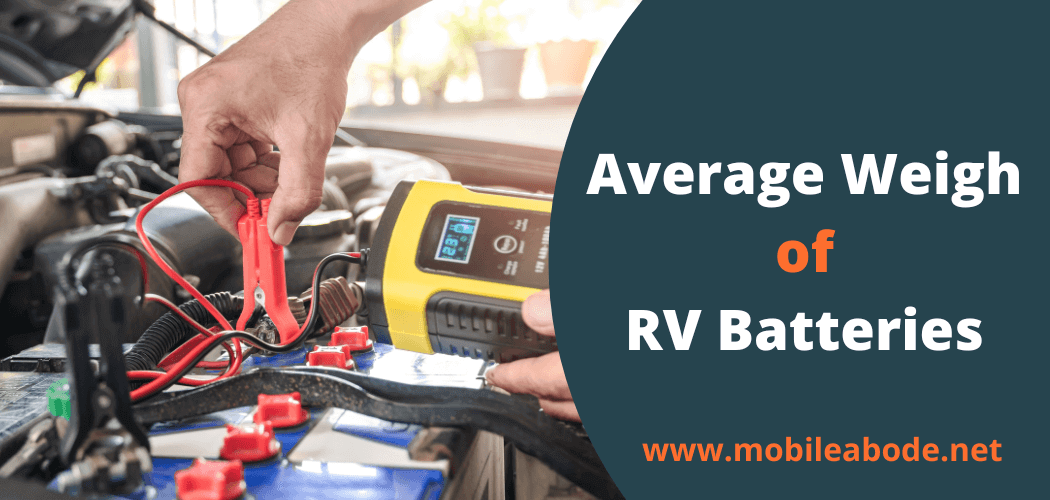RVs rely on batteries to provide power for various components, including the fridge, water pump and lights. If you’re looking to buy an RV, or are just curious about how these batteries work, it’s important to understand the weight of an RV battery.
This post will break down the weight of different types of batteries, so you can figure out which one is best for your needs.
Average Weigh of RV Batteries
A typical RV battery weighs between 50 and 150 pounds. However, the exact weight will depend on the type and size of the battery.
Lead-acid batteries, for example, tend to be heavy, while lithium-ion batteries are much lighter.
Here is a breakdown of the weights of different types of batteries:
1- Lead-acid batteries
These batteries are typically the heaviest type of RV battery, weighing anywhere from 50 to 200 pounds.
AGM batteries are also similar in weight to lead-acid batteries and usually weigh between 50 and 150 pounds.
2- Lithium-ion batteries
These batteries are much lighter than lead-acid batteries, weighing in at around 10 to 40 pounds.
3- Gel cell batteries
These batteries fall somewhere in between lead-acid and lithium-ion batteries in terms of weight, with most gel cell batteries weighing between 25 and 75 pounds.
Now that you know the weight of different types of RV batteries, you can decide which one is right for your needs. If you’re looking for a lightweight option, lithium-ion or gel batteries are a good choice. If you’re looking for a heavy-duty option, lead-acid or AGM batteries are a better option.
What Factors Affect On the Weight of RV Batteries?

There are several factors that affect the weight of RV batteries, including the type and size of the battery.
i) Type of battery
The type of battery has the biggest impact on weight. Lead-acid batteries, for example, are much heavier than lithium-ion batteries.
ii) Size of battery
The size of the battery also affects weight. Larger batteries tend to be heavier than smaller batteries.
The capacity of the battery will also play a role in its weight. Batteries with higher capacities will usually weigh more than those with lower capacities.
iii) Number of Cells
The other factor that can affect the weight of RV batteries is the number of cells in the battery. Batteries with more cells will typically weigh more than those with fewer cells.
iv) Battery Chemistry
The battery chemistry can also affect the weight. For example, AGM batteries are similar in weight to lead-acid batteries.
v) Battery case
The type of case used for the battery can also affect the weight. Some battery cases are made from heavier materials, which will add to the total weight.
Now that you know the different factors that affect the weight of RV batteries, you can choose the right one for your needs.
What is the lightest weight RV battery?
Lithium-ion batteries are typically the lightest-weight RV batteries, followed by gel cell batteries. Lead-acid batteries are usually the heaviest type of RV battery.
What Is The Heaviest RV Battery?
The heaviest RV battery is the lead-acid battery. These batteries can weigh up to 200 pounds, making them one of the heaviest types of RV batteries on the market.
If you’re looking for a lighter weight battery, consider a lithium-ion or gel cell battery. These types of batteries are much lighter than lead-acid batteries, and can still provide plenty of power for your RV’s needs.
Does RV dry weight include propane and battery?
No, the dry weight of an RV does not include the weight of propane or batteries. The dry weight is the weight of the RV without these items.
How much does a group 27 deep cycle battery weigh?
A group 27 deep cycle battery typically weighs between 50 and 75 pounds. This weight can vary depending on the specific battery, so be sure to check the weight before you purchase one.
How much does a 100 amp hour battery weigh?
A 100 amp hour battery typically weighs between 50 and 200 pounds.
Final Words:-
The average RV battery weighs between 40 and 80 pounds. This weight can vary depending on the size and type of battery.
RV batteries come in a few different types, including flooded lead acid, gel cell, AGM, and lithium-ion.
Now you know the weight of an RV battery and what to consider when choosing one. Be sure to keep these factors in mind when selecting your next battery.

